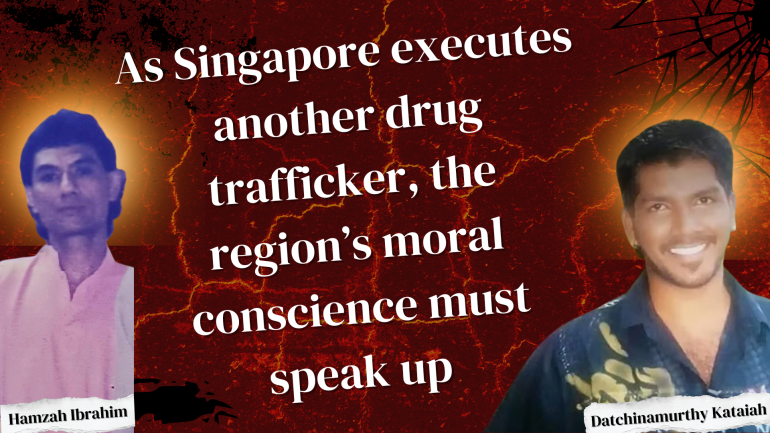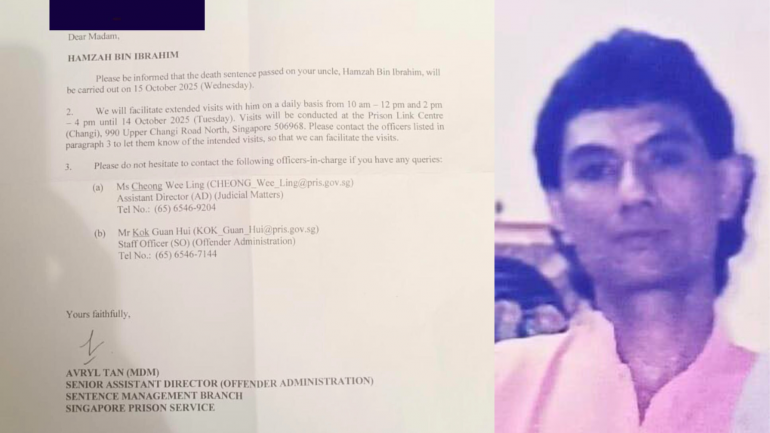As Singapore executes another drug trafficker, the region’s moral conscience must speak up

October is “Respect Life Month”. On October 10, “World Day Against the Death Penalty”, Malaysian Pannir Selvan Pranthaman was laid to rest after he was hanged in Singapore two days earlier.
He was convicted of a capital drug offence under Singapore’s stringent Misuse of Drugs Act, which mandates the death penalty for trafficking certain quantities of controlled drugs, including over 15 grams of diamorphine.
On September 25, Datchinamurthy Kataiah, a Malaysian as well, was executed. He was convicted of trafficking nearly 45g of heroin in the city-state.
Oct 15, Singapore will hang its own citizen for trafficking in drugs.
His name is Hamzah Ibrahim. Hamzah was convicted in 2014 for trafficking 26.29 grams of diamorphine, a quantity that carries the mandatory death penalty under Singapore law.
Now, another rope has been oiled, another dawn chosen. The gallows are ready again.
And for what? Singapore is convinced that taking a life can be a teacher of life - a paradox both haunting and hollow.
The illusion of deterrence
Singapore defends its death penalty as a deterrent to drug trafficking. Yet after decades of hangings, of Malaysians, Singaporeans, Indonesians, Nigerians, the drug problem persists. The rope has not helped the Republic get rid of addiction, only compassion.
Each execution is a ritual of moral contradiction: a government claiming to protect life by taking one, to uphold law by violating conscience. Even if the condemned are guilty, must justice always kill?
Faith says no.
Every major faith that forms the soul of our region, Islam, Christianity, Hinduism, and Buddhism, rejects vengeance as justice. They uphold the sanctity of life as divine, not disposable.
In Islam, life is sacred. The Qur’an says: “Whoever kills a soul…it is as if he has slain all mankind” (5:32). True justice, adil, must always be tempered with rahmah, mercy. Prophet Muhammad himself intervened to prevent executions when forgiveness was possible.
In Christianity, Christ shattered the logic of retribution with one command: “Let him who is without sin cast the first stone.” (John 8:7) The Gospel’s entire moral fabric is woven from mercy. The crucified Christ did not call for His persecutors’ deaths; He forgave them.
In Hinduism, life is sacred because it is divine. The Upanishads remind us: “The Self is not killed when the body is killed.” Thus, to take another’s life is to offend the divine within. True dharma calls for reformation, not retribution.
In Buddhism, the First Precept forbids killing in any form. Compassion (karuna) and loving-kindness (metta) are supreme virtues. A society that kills, even in the name of justice, accumulates collective karma of violence.
By the moral logic of all these faiths, the hangman’s knot is not justice, it is desecration.

Singapore’s moral dissonance
Singapore prides itself on being a clean, efficient, modern state, a city of order. Yet what order is preserved by hanging the poor, the addicted, the desperate? It is no secret that many of those executed come from marginalised backgrounds, Malaysians, often Tamil or Malay, with limited legal aid, caught in a machinery too sleek to stop. The gallows are always silent, clinical, and bureaucratic.
Officials will insist that “the law must take its course.” But the law, like any human creation, is only as moral as those who wield it. A law that extinguishes mercy cannot claim moral legitimacy, no matter how well it functions.
The silence of faith communities
Where are the religious voices in Singapore and Malaysia? Where are the imams, priests, monks, and pandits who speak of compassion every Friday, Saturday, and Sunday?
Too many pulpits have fallen silent. Too many temples and mosques stay out of “political matters.” But what is faith for, if not to defend the sanctity of life?
We cannot chant prayers for peace while allowing the state to prepare its hangman’s rope. We cannot speak of divine mercy while standing mute before man-made cruelty.
The Malaysian dilemma
The executions of Datchinamurthy, Pannir Selvam, and now Hamzah are not just Singapore’s moral burden; they are Malaysia’s shame as well. Our citizens die abroad while we negotiate trade deals and attend regional summits.
When one Malaysian dies on foreign soil by state decree, it should wound the conscience of the entire nation. A government that values life must defend it, even when diplomacy trembles.
Prime Minister Anwar Ibrahim, himself a man once imprisoned unjustly, knows the taste of the cell. His administration has courageously moved to abolish the mandatory death penalty. But our moral duty cannot end at our borders. We must speak for our citizens still condemned elsewhere.
A plea across religions
This is not a debate about crime. It is a plea for conscience. It is a reminder that no state, however modern, however powerful, should wield the authority to end what God, karma, or nature alone can take.
Can any faith truly remain silent when life is taken in the name of justice?
The execution of Hamzah Ibrahim on October 15 will not make Singapore a safer place, only a sadder one, drained of compassion, stripped of humanity, and distant from God. When the trapdoor opens, it is not just one man who dies.
It is human dignity itself that breathes its last.








